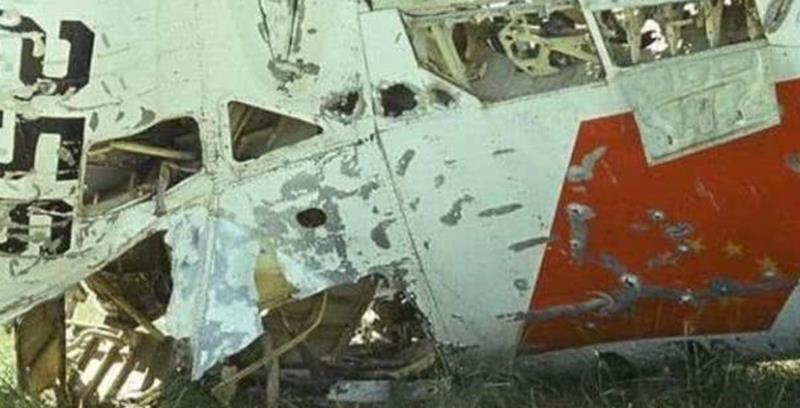At 2:30 a.m. on September 13, 1971, a Trident plane flying from Shanhaiguan Airport crashed near Öndurkhaan in Mongolia. At that time, Mongolian officials did not know that this plane was a special plane, and there were Lin Laozong, Lin Liguo, and a number of staff members of the "Forest Office" on the plane, so it was only treated as a general accident.

Shortly after the September 13 incident, Xu Wenyi, the mainland's ambassador to Mongolia, became the first Chinese to rush to the scene of the accident, he investigated the situation at the scene in detail, and took a large number of pictures of the scene, while properly handling the crash and successfully completing the tasks assigned by the organization.
Xu Wenyi was born in 1917, a native of Shanghai, and received a good education from an early age. During his studies, Xu Wenyi came into contact with progressive ideas and began to participate in anti-Japanese propaganda activities. In 1938, the year after the outbreak of the War of Resistance Against Japan, Xu Wenyi decided to join the Eighth Route Army, after which he successively served as the commander of the new second company and the company instructor. Xu Wenyi was one of the few readers in the army, and the organization soon discovered this advantage of his, and also arranged for him to enter the Russian Language Department of Yan'an University as a leader, which also laid the foundation for him to engage in diplomatic work in the future.
During the Liberation War, Xu Wenyi followed the large army to the northeast and participated in the creation of the northeast base area. During his time in Northeast China, Xu Wenyi mainly undertook the work of translation, and his translation level was very high, providing an effective way for the two sides to communicate information. Xu Wenyi also participated in a series of large-scale battles such as the Battle of Jinzhou and the Battle of Liaoshen, and after the Northeast Field Army entered Guanxi, Xu Wenyi also returned to Guannei and participated in the Battle of Pingjin, and was one of the heroes who witnessed the founding of New China.
After the founding of New China, Xu Wenyi entered the diplomatic department and served as the secretary general of the Embassy in East Germany, and soon after he was appointed as the director of the Ministry of Foreign Affairs and the counselor of the Embassy in congo, and did a lot of basic work for the diplomatic cause of New China in the early days of the founding of the People's Republic of China, and was one of the heroes who promoted Asian-African friendship.
In 1971, Xu Wenyi was appointed ambassador to Mongolia, and a major event occurred in the early morning of September 13, when Mr. Lin, his wife, son and others took a Red Flag sedan to Shanhaiguan Airport and boarded a Trident plane that had been parked there early to wait for them. The plane took off and headed northwest, and at 2:30 a.m., it crashed near Öndörkhaan, Mongolia, killing all the people on board.
After the September 13 incident, because the plane crashed in Mongolia, the relevant departments in Mongolia rushed to the scene at the first time. However, they do not know the true identity of the people on board the plane and therefore treat them only as ordinary accidents. As an ambassador to Mongolia, Xu Wenyi knew the true identity of the people on the plane and knew the importance of the 913 incident, so he rushed to the scene of the accident as soon as he got the news, and was also the first Chinese to rush to the scene.
Before arriving at the scene of the accident, Xu Wenyi had been ordered by his superiors to properly handle the crash, so Xu Wenyi was very cautious about the incident, and he took a large number of photos at the scene, preserving the complete evidence of the incident. It is worth mentioning that the photos provided by Xu Wenyi also solve a key problem.
After the 913 incident, because of a hole in the wing of the Trident aircraft, there was a sound of the aircraft being shot down by missiles on the international side. The relevant departments set up an investigation team and invited the famous pilot Wang Hai to investigate the incident. Wang Hai found through Xu Wenyi's photo that the hole was actually a one-sided explosion, and the aluminum thorns were turned outward, proving that the hole was caused by the fire and explosion of the gas tank inside the aircraft, thus overturning the conclusion that the aircraft was shot down by a missile.
Xu Wenyi was praised for properly handling the 913 incident, and soon after Xu Wenyi returned to China to prepare for the establishment of the journal "World Knowledge", and in 1979 he re-entered the Ministry of Foreign Affairs as ambassador to Lebanon. In his later years, Xu Wenyi devoted himself to promoting world peace and served as vice president of the China-Mongolia Friendship Association.